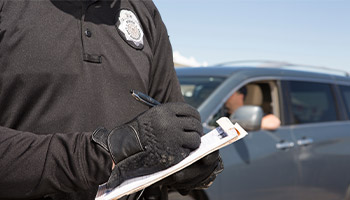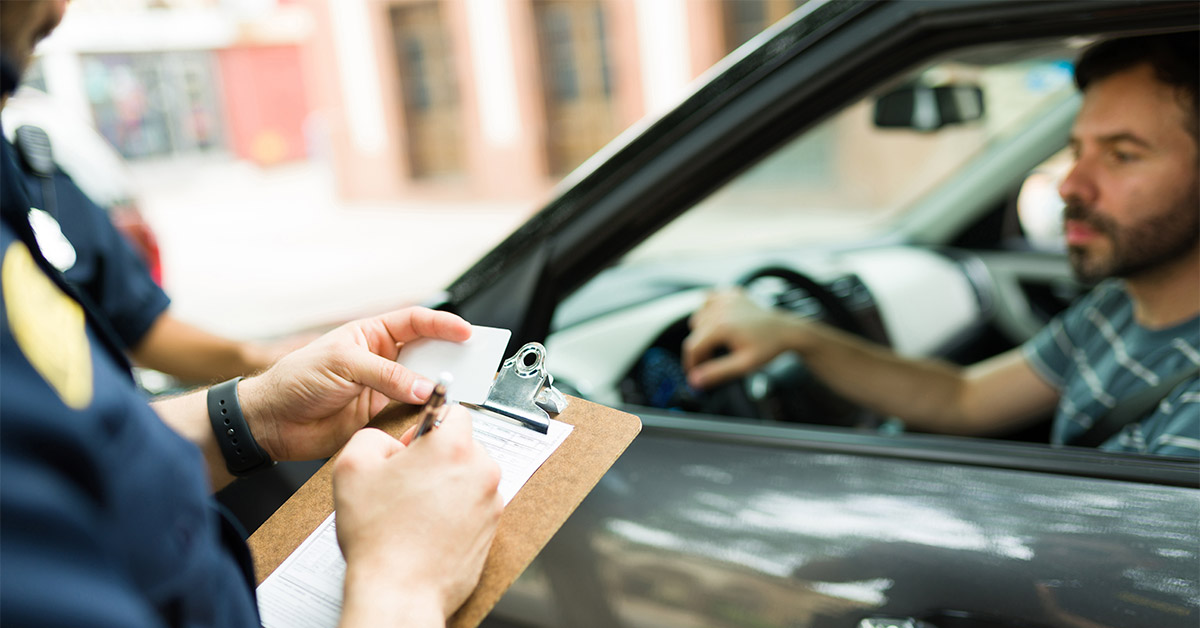For most adults, driving is just another part of everyday life. Whether you’re on your daily commute or going on a weekend road trip, driving is probably the easiest and most convenient way for you to get around. Unfortunately, many people drive over the speed limit to get from point A to point B. Maybe you were running late to a dentist appointment or your teen’s football game, but now, like many other drivers, you must deal with a speeding ticket.
Key Takeaways:
- A speeding ticket could increase your rate by up to 20% or more, depending on where you live and the severity of the violation.
- Insurance providers consider multiple factors when determining your rate, so some may penalize a speeding ticket more than others.
- A speeding ticket can remain on your driving record for 3 to 5 years.
- Switching car insurance providers, utilizing insurance discounts, and taking a traffic course could reduce the harmful effects of a speeding ticket.
How Does a Speeding Ticket Affect My Car Insurance?

Your driving record is one of the main factors auto insurance companies consider when calculating your rate. That’s why multiple speeding tickets can affect your insurance significantly. Typically, you will see the effect of a speeding ticket once your policy is up for renewal. This is when insurance companies can review your driving record and discover any traffic violations. On average, drivers could see a 20% increase in their car insurance premiums after receiving a speeding ticket. However, it can vary heavily depending on the state and insurer.
Keep in mind that speeding tickets can affect different drivers in different ways, if at all. It’s possible that some insurance companies may not increase your rate if it is your first traffic violation or for other factors involved. Although coverage types are generally the same regardless of provider, premiums vary significantly from company to company.
Suppose a single ticket leads to a rate increase. In that case, you can expect another moving violation to increase your premium even more with the same insurer. In general, the more severely your state classifies marks on your driving record, the likelier that your insurance company will increase your rates due to a speeding ticket.
How Long Will a Speeding Ticket Stay on My Driving Record?
Once you sign and receive your copy of the speeding ticket, it will remain on your record for 3 to 5 years, depending on where you live. In California, for example, speeding tickets stay on your driving record for 3 years on average. In other states, like Massachusetts, speeding tickets remain on a driver’s record for 5 years on average.
The first consequence of receiving a speeding ticket is paying a fine. The fine will vary depending on how many miles per hour you were driving over the speed limit and in what state you were driving. In California, a speeding violation could cost you up to $500 or more, plus any court costs and assessments. That does not include any potential rate increases you may face.
If you accumulate several speeding tickets or other traffic citations in a short period, you could face more consequences than a fine. Not only will you have higher auto insurance rates, but your current provider may even decide not to renew your policy. Too many traffic violations could also cause your license to be suspended.
How Many Speeding Tickets Are Issued Each Year?

Speeding tickets are one of the most common traffic violations throughout the country. Although we all understand that driving the speed limit is legally required, it’s normal for the flow of traffic to sometimes be over the limit—but that doesn’t make it okay. It’s estimated that about 41 million speeding tickets are issued each year in the United States.
According to 2022 data, these ten states had the highest percentage of drivers cited for speeding:
1) Ohio – 14.95%
2) Iowa – 14.87%
3) North Dakota – 14.41%
4) Wisconsin – 13.43%
5) South Carolina – 13.35%
6) Virginia – 12.65%
7) Alaska – 12.40%
8) Washington – 12.17%
9) Colorado – 12.03%
10) Wyoming: 12.01%
Can You Remove a Speeding Ticket from Your Driving Record?
Sometimes, you’re simply not paying close enough attention to the speed limit of the road you’re on. Or maybe you’re on a street when the speed limit drops unexpectedly after a particular intersection. Whatever the case, you can do a few things to remove the harmful effects of a speeding ticket from your record.
- Contest the ticket in court: If you decide to fight it and don’t have evidence proving you weren’t speeding, it will likely be your word against the officer involved. However, if you can convince the court, the speeding violation will not appear on your driving record.
- Take a traffic school course: Some states may allow you to reduce the effects of a speeding ticket by taking a traffic course. Although you may still need to pay some fines related to the violation, in many cases you can remove the first citation from your record by going to traffic school. Any citations received after the first (within a specified number of years) will stay on your record.
- Slow down: Slowing down won’t remove the negatives of a speeding ticket. Still, it will keep you from further hurting your driving record.
How to Lower Your Car Insurance Rate After a Speeding Ticket

If you recently incurred a speeding ticket and are facing a car insurance rate increase, don’t worry too much. Although no one wants to pay more for car insurance than they have to, there are ways to find favorable rates even after a traffic violation. Remember, auto insurance companies weigh various factors differently, meaning one insurer may penalize speeding tickets more than others. Consider doing the following to reduce your premium after a ticket:
- Switch insurers: If you only have one moving violation on your record, one company may increase your rate while another may not. Switching insurers after receiving a ticket can lower your premium.
- Compare rates: If you plan to switch carriers, you must compare rates. Since providers can weigh factors differently, shopping around will help you get a better sense of what your options are. Instead of going with the first quote you find, compare multiple to get the best deal.
- Take a safe driving course: Some insurers provide discounted rates for drivers who complete a defensive driving or accident prevention class.
- Look for additional discounts: Insurers typically offer various auto insurance discounts you may be eligible for by simply being you. Contact your agent to see if you qualify for common discounts, such as a good student or multi-policy discount.
Speak With an Insurance Specialist Today
At AIS, we have over 55 years of experience helping our customers find and compare quotes from our network of insurance providers. Our specialists will guide you along your search, help you understand the coverage you need, and find potential savings along the way. If you’re facing a rate increase due to a speeding ticket or for any other reason, call (888) 772-4247 to speak with an insurance specialist today or start a quote online.
The information in this article is obtained from various sources and offered for educational purposes only. Furthermore, it should not replace the advice of a qualified professional. The definitions, terms, and coverage in a given policy may be different than those suggested here. No warranty or appropriateness for a specific purpose is expressed or implied.


